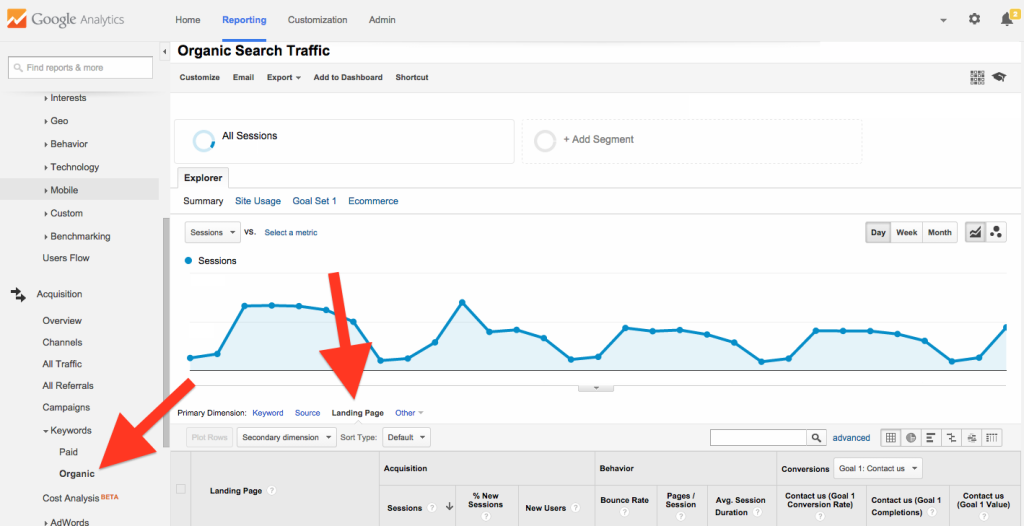How to Uncover Keywords that Attract Your Ideal Customer
When considering SEO, most executives and owners only care about ranking for those really important, high traffic (and high competition!) keywords. But did you know that as much as 90% of your potential SEO traffic comes from long-tail keywords? These are keyword phrases that get relatively little traffic individually, but when combined, make up a huge majority of search traffic. Plus, long-tail traffic has a higher conversion rate. Sounds pretty good right? Creating a keyword strategy for the long-tail means understanding the full spread of keywords that your target market is Googling every day. To make sure I’m not missing any opportunities, I start any keyword research project by pulling keyword ideas from a wide array of sources.
1 – Big Data for Keyword Ideas
“What big data? I don’t have any big data.” Think again. You have a pile of big data at your fingertips, and you don’t have to pay a dime to dip into it:
Google Autocomplete
Start typing some core keywords. What does Google think you’re up to?  Those aren’t random suggestions. Those are popular long-tail queries.
Those aren’t random suggestions. Those are popular long-tail queries.
Google Related Searches
More keyword ideas, straight from the mind of Google, these boxes typically appear at the end of the first page of search results. Start with terms you know are relevant, and see where Google leads you.
Wikipedia
If you haven’t yet read the Wikipedia article for the business’ main topic(s), get to it! Keep an eye out for words and phrases that aren’t already on your keyword list, and follow links to related articles to keep reading.
Social Media
What better way to learn which words people use on a daily basis than to study the words they are using on a daily basis? There are dozens of social media search and explore tools; my favorite is Topsy. Use it to search for words and phrases that people use when discussing topics relevant to your business.
2 – Free (and Wildly Easy) Tools for Keyword Ideas
There are a ton of keyword tools out there. Here are a few of my favorites:
- SEMrush – Check up on the keywords that your competitors are using to attract organic (and paid) traffic. Genius!
- KeywordTool.io – Google Keyword Suggest on steroids. View every possible Google Suggest around the word or phrase of your choice. This is very helpful when you hit a dead end but know there are more keywords out there.
- MetaGlossary – This is a massive resource for related terms and definitions from multiple sources.
Don’t use tools just because someone else uses them, though. The trick is to find a few tools that are helpful and easy for you.
3 – Keyword Ideas in the ‘Real World’
The best keywords are the most natural, and the best place for natural language is not always the internet. Pay attention offline, and you’ll likely tune in to some great keyword ideas.
- Sales – When you’re talking to your sales team, listen to the vernacular. What words do they use to describe the product/service? How do they sell it to prospects?
- Buyers – Similarly, talk to your existing clients. What language do they use to communicate their needs? What do they think your brand does?
- Events – When you’re at a conference or trade show, listen to what the speakers are calling your business, product, service, or niche. What about the vendors? How are they selling to your industry? Keep a notepad or app handy so you can jot down ideas.
If you’re new to the organization, crawl through the company’s website, planning and strategy documents, etc. What words and phrases get repeated? What stands out? And if you’re a marketing agency, ask the client to fill out detailed discovery documents. Asking them to type out feedback (as opposed to only asking questions in meetings) gives the client more time to reflect. They can also pass the documents to other key players, such as their engineers – who have years of experience, and whom you may not otherwise have a chance to meet.
4 – Analytics and AdWords for Keyword Ideas
What about your own historic SEO traffic? Check out the keywords that are driving your traffic, and that have been most effective in the past, in Google Analytics by navigating to Acquisition > Keywords > Organic. With Google now hiding 95% (or more) of the keyword referrers, be sure to jump to the Landing Page section to see where SEO visitors are landing. This will give you a rough idea of what words might have been used when the actual keyword was “(not provided).” 
Start Big
Now, you’re ready to run all the words and phrases you’ve found through AdWords Keyword Planner to see if Google has even more suggestions for you. Where does it end? Nobody knows! (And nobody wants to.) If you take advantage of each of these four opportunities, you will probably have more keyword ideas then you can handle, but keep going. This is not one of those things that you start small, and add to as you get comfortable. Instead, my best advice is to do all four, create a huge list of keywords, and then prioritize carefully. More on prioritizing keywords in an upcoming post. In the meantime, start building your list!
What's Next?
Profound Strategy is on a mission to help growth-minded marketers turn SEO back into a source of predictable, reliable, scalable business results.
Start winning in organic search and turn SEO into your most efficient marketing channel. Subscribe to updates and join the 6,000+ marketing executives and founders that are changing the way they do SEO:
And dig deeper with some of our best content, such as The CMO’s Guide to Modern SEO, Technical SEO: A Decision Maker’s Guide, and A Modern Framework for SEO Work that Matters.




